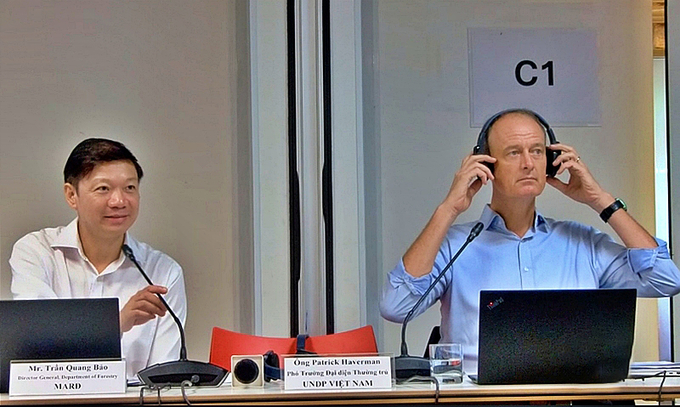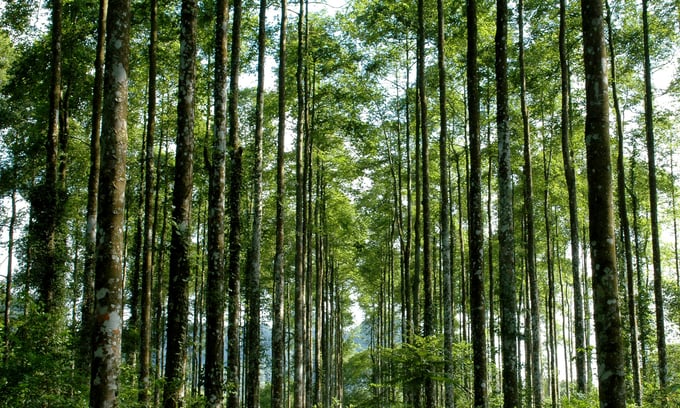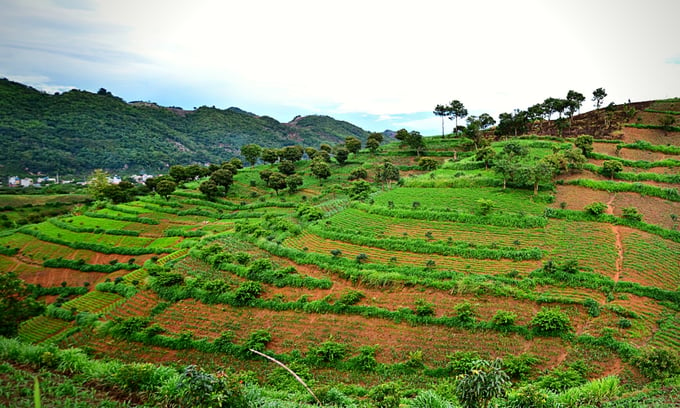May 25, 2025 | 04:51 GMT +7
May 25, 2025 | 04:51 GMT +7
Hotline: 0913.378.918
May 25, 2025 | 04:51 GMT +7
Hotline: 0913.378.918

The Director of the Department of Forestry, Tran Quang Bao, and the Deputy Resident Representative for UNDP Vietnam chaired the workshop. Photo: Bao Thang.
At the Technical Workshop on Reviewing the Readiness of the Coffee and Wood Sectors to Implement EUDR in Vietnam on the morning of July 30, Mr. Patrick Haverman, Deputy Resident Representative for UNDP Vietnam, assessed that Vietnam is among the leading countries adapting to the EUDR.
Immediately after the EU issued the EUDR, the Vietnamese Government issued Resolution 88/ND-CP dated June 8, 2023, in which the Ministry of Agriculture and Rural Development was assigned to preside over and coordinate with relevant agencies to develop an action plan to adapt to the EUDR.
According to the newly issued regulations of the EU, large enterprises must comply with the EUDR from December 30, 2024, while small and medium enterprises will start applying from June 30, 2025. In the context of limited time, Mr. Haverman proposed 4 issue groups for relevant parties to consider and promote.
The first is sharing data on boundary maps, forest status and how to share on platforms; The second is the method of analyzing the deforestation-free standard to comply with EUDR; The third is the process of analyzing the legality of raw materials, production methods and product processing; Finally, support for smallholder farmers such as providing knowledge and resources to help them ensure their livelihoods.
"The commitments of the private sector are extremely important in this process because their actions will contribute to shaping the sustainable development of industry chains," Mr. Haverman shared.
Mr. Pham Duc Thieng, an expert on the Comprehensive Sustainable Landscape Management Project through the approach of sustainable development without causing deforestation (iLandscape), added that Vietnamese enterprises mainly supply raw materials to large enterprises. "If we subtract one month of processing and one month of transportation, many Vietnamese wood material suppliers must comply with EUDR from October 2024," Mr. Thieng raised the issue.

The definition of forest in Vietnam and FAO still has many inconsistencies, causing difficulties in complying with the EUDR. Photo: Bao Thang.
Going into the technical details, Mr. Thieng added that there are areas that Vietnam considers to be forests but the EU does not, or vice versa. This stems from differences in the definition of forests between the two sides, such as the minimum forest area prescribed by the EU is 0.5 hectares, while Vietnam is 0.3 hectares, or the EUDR has no regulations on land use planning while Vietnam does.
Another example the expert gave is that according to the EUDR, agroforestry production, such as growing coffee and fruit trees on forest land, is considered to risk causing deforestation and forest degradation. Meanwhile, Decree 156/2018/ND-CP allows production in protection forests and production forests as long as it does not cause a decrease in forest area and quality.
Mr. Truong Tat Do, Department of Science, Technology and International Cooperation, Department of Forestry, said that on June 12, 2024, the Minister of Agriculture and Rural Development issued Decision No. 1235 to establish a joint working group to adapt to EUDR, including all relevant industries, and assigned the Department of Forestry to take the lead in implementing tasks related to timber and forest boundary maps.
In the EUDR regulations, 7 groups of commodities are affected, but in Vietnam, there are mainly 3, including timber and timber products, rubber, and coffee. Products manufactured in this group of commodities must comply with 3 conditions: not causing deforestation compared to the current status on December 31, 2020, proving the legality of production according to the regulations of the importing country, and having an appraisal report on this legality.
"Legality needs to be proven throughout the chain, from raw materials, processing to export," Mr. Do expressed.
The four basic requirements that businesses must comply with according to EUDR include the coordinate location of the cultivated land plot, having a forest boundary map on December 31, 2020, and the time of assessment (forest defined according to FAO), checking data using multi-temporal (spatial) satellite images and tracing products to the geographical location of the cultivated plot (information includes producer, productivity, output, product type, etc.).

According to EUDR, agroforestry production is at risk of causing deforestation and forest degradation. Photo: Bao Thang.
As a foundation for assessing EUDR for industries, the forestry sector has provided input information for the EU to classify countries according to risk through the results of forest management, protection, and development, as well as the implementation of international commitments on forests (FCPF, LEAF/Emergent), the Glasgow Declaration, VPA/FLEGT... At the same time, the forestry sector is committed to providing a database on forest boundaries to serve traceability.
The advantage for Vietnam in adapting to EUDR is that since 2014, natural forests have been closed and stopped exploitation. In addition, Vietnamese enterprises are familiar with the EU Timber Regulation 995/2010, participating in the implementation of VPA/FLEGT, and the timber agreement with the United States. In addition, the area of forests certified for sustainable forests is increasing rapidly and is expected to reach 1 million hectares soon.
Besides the advantages, Vietnam also faces challenges in terms of databases. According to the assessment of experts from the EU Joint Research Centre (JRC), Vietnam's forest coverage rate is about 60%, one and a half times higher than the figure announced by Vietnam (more than 42%). The reason is that the EU includes the area of shade trees, fruit trees, and intercropped industrial crops. "The JRC announcement can be the basis for the EU to assess Vietnam's ability to adapt to the EUDR," Mr. Do emphasized.
Another difficulty is the issue of traceability with mixed raw material products such as wood pellets and wood chips. This is a difficult requirement because sawdust, shavings of pellets, and wood chips come from many different establishments.

Department of Forestry's experimental deforestation warning system. Photo: Bao Thang.
Mrs. Regina Ecker, Country Director, GIZ Viet Nam, informed that many organizations and individuals have recently proposed and recommended detailed guidelines for implementing EUDR. In addition, some opinions wish to use certifications from competent authorities on good practices or not causing deforestation or forest degradation.
However, certification is only one factor for the EU to consider in the EUDR compliance process and support risk assessment, according to Mrs. Ecker. "Members in the supply chain can use certification programs and systems but still have to implement accountability and be responsible for any violations," said the Country Director, GIZ Viet Nam.
Summarizing the opinions, Director Tran Quang Bao committed to responding to the difficulties in implementing EUDR with the EU and sharing the plans that Vietnam has implemented. While waiting for the EU to issue detailed guidelines on EUDR, the Department of Forestry will build a database to demonstrate compliance with regulations that do not cause deforestation and classify and identify each risk area across the country.
"EUDR stipulates that exported products must have geographical coordinates, but Vietnam has no legal regulations. It is just one of the issues that the Forestry Department continues to research, perfect forestry regulations, and organize training sessions to improve enforcement capacity for businesses and the supply chain," Mr. Bao affirmed.
Translated by Huong Giang

(VAN) The mutual export of agrifood products between the European Union (EU) and the United Kingdom (UK) must occur again without certification, border controls or other red tape. This was agreed at the UK-EU summit.
/2025/05/22/5121-2-173645_677.jpg)
(VAN) NBSAP Tracker identifies strengths and areas for improvement in the National Biodiversity Strategy, based on each region’s priorities and capacities.

(VAN) The draft amendment to the Circular on rice export trading stipulates a periodic reporting regime for rice exporting enterprises.

(VAN) Dong Thap farmers attained an average profit margin of 64% during the summer-autumn 2024 crop (first season), while An Giang and Kien Giang farmers followed with 56% and 54%, respectively.

(VAN) As a doctoral student doing research on renewable energy and electrification at Harvard University, the author shares his musings on electricity, nature, and countryside memories.

(VAN) The decree on Extended Producer Responsibility (EPR) ensures transparent management and disbursement of support funds, avoiding the creation of a “give-and-take” mechanism.

(VAN) Hue City rigorously enforces regulations regarding marine fishing and resource exploitation, with a particular emphasis on the monitoring of fishing vessels to prevent illegal, unreported, and unregulated (IUU) fishing.